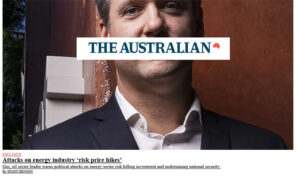September 17, 2021
Comment by Greg Ray
The announcement that Australia is dumping its deal to buy French submarines in favour of American nuclear subs shouldn’t be much of a shock. While Australia’s conventional diesel-electric submarine fleet has had some advantages in the past, it has also had its limitations and – frankly – having more nukes in the region suits the strategic needs of the US. Those needs are spelled out in the creation of “AUKUS”, a new tripartite deal between the anglophone nations of the USA, the UK and Australia to share military technology to keep China contained in the Asia-Pacific region.
Flowing from those two big announcements are subsidiary ones: that the US will also send more aircraft and weapons platforms to Australia (adding to a presence already substantially increased in recent years) and will also consider ways of helping shield Australia from the impact of likely economic retaliation by an angry China.
With suggestions that Australia may hold an election as soon as next March or April, the announcement’s timing suits the US, since it will all be a fait accompli if the ALP manages to win. And from the ALP’s point of view if it wins it will be saved the trouble of debating the topic. [As a sidelight, perhaps the development will also be a shoehorn to lever nuclear power into Australia – a splendid earner for US corporations that can be sold as a solution to global warming fears.]
When it comes to economic rivalry between major powers there are no good guys. And, as the African saying goes, when elephants fight, the grass gets trampled. There is no doubt that the biggest elephant battle around at present is between the USA and China, and Australia happens to be part of the turf where the battle is warming up. For years, Australia has tried to steer a more-or-less middle path between its traditional superpower sponsor, the USA, and its emergent major trading partner, China. This has always been tricky, but at least it was possible while the US and China were content with their own mutually beneficial trading arrangement.
But even while US corporations were exporting the jobs of Americans and turning low-wage China into the factory for the world, the warnings were being sounded. As long ago as 2012 former Chinese military officer Song Xiaojun warned that, sooner or later, Australia would have to choose a “godfather”. “Australia always has to depend on somebody else, whether it is to be the ‘son’ of the US or ‘son’ of China,” he said. “[It] depends on who is more powerful, and based on the strategic environment,” he said.
This was about the time that the US had decided to reassert itself in the Asia-Pacific region, taking advantage of the nervousness among countries in this part of the world at China’s increasingly belligerent behaviour. The US shifted a pile of marines into Australia’s north, boosted its naval presence and zipped around the region reassuring Japan, the Philippines – and others feeling the heat from Chinese muscle – that America was right behind them. At the time, US Secretary of state Hilary Clinton scoffed at the idea that Australia had to make a choice of one powerful friend over another. “We support Australia having strong, multi-faceted ties with every nation in the Asia Pacific, indeed in the world, including China. Just as we seek the same. And I have said repeatedly, the Pacific is big enough for all of us,” Ms Clinton said. And then noted that: “the US-Australia alliance is not a matter of calculation, or cost-benefit analysis, though the benefits are clear. It is much deeper than that. It is in our DNA; it is rooted in shared history and shared struggles to overcome adversity and build a better future for ourselves, our families and future generations”.
A little later, in 2014, Ms Clinton (no longer secretary of state but still a major force in US politics), accused Australia of two-timing. She believed Australia had become too dependent on China, and feared that might make it hard, if push came to shove, for Australia to preserve its “freedom of movement and sovereignty, both economic and political”.
In Australia in 2019, American political scientist and international relations scholar John Mearsheimer said China would continue to grow economically and would attempt to dominate Asia “the way the US dominates the Western Hemisphere”.
“Now the question is what does this all mean for Australia?” Mearsheimer said. “Well, you’re in a quandary for sure. Everybody knows what the quandary is. And by the way you’re not the only country in East Asia that’s in this quandary. You trade a lot with China, and that trade is very important for your prosperity, no question about that. Security-wise you really want to go with us. It makes just a lot more sense, right? And you understand that security is more important than prosperity, because if you don’t survive, you’re not gonna prosper.” “Now some people say there’s an alternative: you can go with China,” said Mearsheimer. “Right you have a choice here: you can go with China rather than the United States. There’s two things I’ll say about that. Number one, if you go with China you want to understand you are our enemy. You are then deciding to become an enemy of the United States. Because again, we’re talking about an intense security competition . . . You’re either with us or against us . . . And if you’re trading extensively with China, and you’re friendly with China, you’re undermining the United States in this security competition. You’re feeding the beast, from our perspective. And that is not going to make us happy. And when we are not happy you do not want to underestimate how nasty we can be. Just ask Fidel Castro.”
During his chaotic presidency, Donald Trump constantly needled China, and when Joe Biden won office he declared that he would stop China surpassing the US as the world’s most powerful nation. “China has an overall goal … to become the leading country in the world, the wealthiest country in the world, and the most powerful country in the world,” he told reporters at the White House. “That’s not going to happen on my watch because the United States is going to continue to grow,” Biden said.
And that’s where we are today. The US is tightening its hold on the Asia-Pacific components of its sprawling empire and ramping up the military encirclement of China. Japan, India and Australia are perhaps the biggest key players in this strategy. Hence, in Australia’s case, the submarines, the marine deployments, the bombers, the war games. Hence, more broadly, the withdrawal of previous tacit support for the idea that, one day, China and Taiwan should be reunited under one rule.
What will China do? Will it calm itself and accept (or at least appear to accept) the subservient role in the corporate global economy that is offered it? Can its leaders, having staked so much of their prestige on nationalism and expansion, afford to do that? Or will China lose patience and make a move that brings on the elephant fight in a big way?
Australia has unequivocally chosen its “godfather” now. Already strongly integrated into the US global military system, it has elected to cement itself into that position more firmly than ever. If the elephants fight, Australia’s grass stands a good chance of being trampled.


